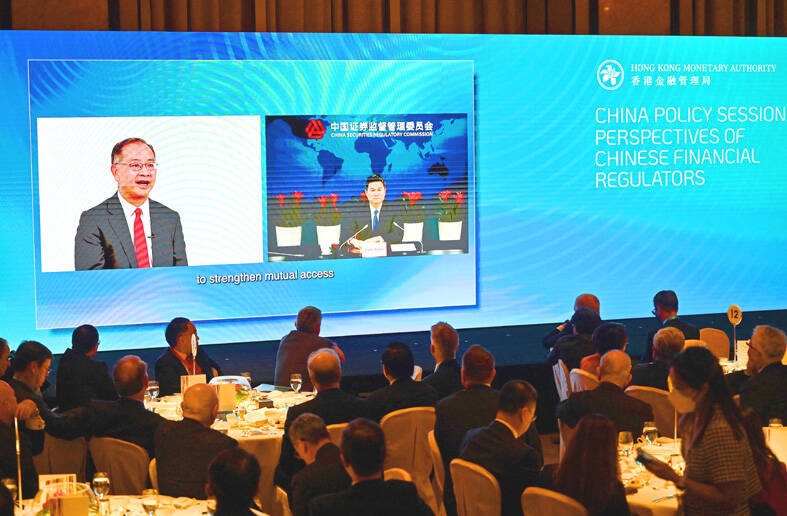Investors should avoid reading international news coverage of China’s economy, a top Chinese securities regulator yesterday told a summit of global bankers in comments that received endorsement from two senior executives.
The advice was made by China Securities Regulatory Commission Vice Chairman Fang Xinghai (方星海) in a prerecorded interview that was broadcast to a summit in Hong Kong.
“I deal with international investors quite a lot in my daily work and I am afraid some of them have read too much the international media reports about events in China,” he said.

Photo: AFP
“A lot of media reports, let me put it this way, they really don’t understand China very well and they have a short term focus... Don’t read too much of international media,” he added.
Hong Kong is hosting a week of high-profile events after years of political unrest and COVID-19 pandemic travel restrictions tarnished the territory’s business-friendly reputation, sparked an exodus of talent and battered its economy.
Senior executives from banks such as Goldman Sachs Group Inc, Morgan Stanley, Blackrock Inc, JPMorgan Chase & Co, UBS Group AG, HSBC Holdings PLC and Standard Chartered PLC are among those attending.
In a later panel discussion, UBS chairman Colm Kelleher backed Fang’s comments.
“Like Vice Chairman Fang said: We’re not reading the American press, we all buy the story,” he said.
Kelleher added that international bankers were “very pro-China” and watching closely as to whether the world’s second-largest economy would reopen.
Bank of China (中國銀行) president Liu Jin (劉金) also referenced Fang’s remarks in comments about China’s deeply indebted property market.
“Don’t worry too much. As Mister Fang said, don’t read too much negative reports,” he told delegates.
China is the last major economy committed to a “zero COVID-19” strategy, persisting with snap lockdowns, mass testing and lengthy quarantines. The measures have stamped out outbreaks, but created growing economic pain for local and international businesses.
Huge defaults have hit China’s property sector in the past 18 months, much of its revelations that were first reported on by international media.
Domestic media is state-controlled in China, and censorship is used to suppress negative stories or critical coverage.
Foreign media face intense restrictions, but have more leeway and are a conduit of information in a country where official economic data can sometimes be opaque.
In his comments, Fang told investors to “find out what’s really going on in China, and what’s the real intention of our government, by themselves.”
However, China has been largely cut off from the rest of the world for the past two years by pandemic travel controls. Beijing has yet to signal any timeframe for whether and when China might move away from its “zero COVID-19” controls.

The US dollar was trading at NT$29.7 at 10am today on the Taipei Foreign Exchange, as the New Taiwan dollar gained NT$1.364 from the previous close last week. The NT dollar continued to rise today, after surging 3.07 percent on Friday. After opening at NT$30.91, the NT dollar gained more than NT$1 in just 15 minutes, briefly passing the NT$30 mark. Before the US Department of the Treasury's semi-annual currency report came out, expectations that the NT dollar would keep rising were already building. The NT dollar on Friday closed at NT$31.064, up by NT$0.953 — a 3.07 percent single-day gain. Today,

‘SHORT TERM’: The local currency would likely remain strong in the near term, driven by anticipated US trade pressure, capital inflows and expectations of a US Fed rate cut The US dollar is expected to fall below NT$30 in the near term, as traders anticipate increased pressure from Washington for Taiwan to allow the New Taiwan dollar to appreciate, Cathay United Bank (國泰世華銀行) chief economist Lin Chi-chao (林啟超) said. Following a sharp drop in the greenback against the NT dollar on Friday, Lin told the Central News Agency that the local currency is likely to remain strong in the short term, driven in part by market psychology surrounding anticipated US policy pressure. On Friday, the US dollar fell NT$0.953, or 3.07 percent, closing at NT$31.064 — its lowest level since Jan.

The New Taiwan dollar and Taiwanese stocks surged on signs that trade tensions between the world’s top two economies might start easing and as US tech earnings boosted the outlook of the nation’s semiconductor exports. The NT dollar strengthened as much as 3.8 percent versus the US dollar to 30.815, the biggest intraday gain since January 2011, closing at NT$31.064. The benchmark TAIEX jumped 2.73 percent to outperform the region’s equity gauges. Outlook for global trade improved after China said it is assessing possible trade talks with the US, providing a boost for the nation’s currency and shares. As the NT dollar

The Financial Supervisory Commission (FSC) yesterday met with some of the nation’s largest insurance companies as a skyrocketing New Taiwan dollar piles pressure on their hundreds of billions of dollars in US bond investments. The commission has asked some life insurance firms, among the biggest Asian holders of US debt, to discuss how the rapidly strengthening NT dollar has impacted their operations, people familiar with the matter said. The meeting took place as the NT dollar jumped as much as 5 percent yesterday, its biggest intraday gain in more than three decades. The local currency surged as exporters rushed to